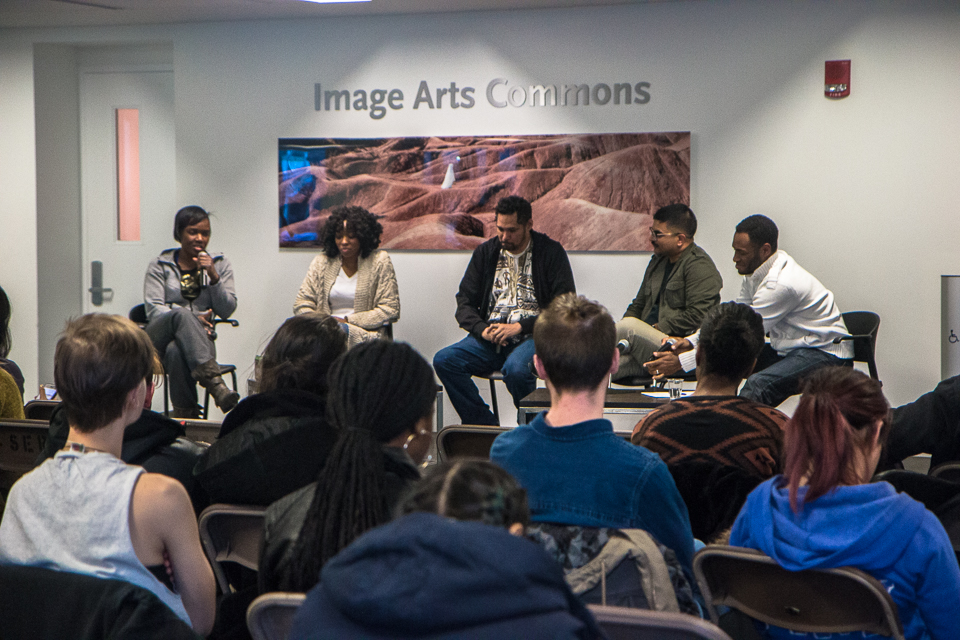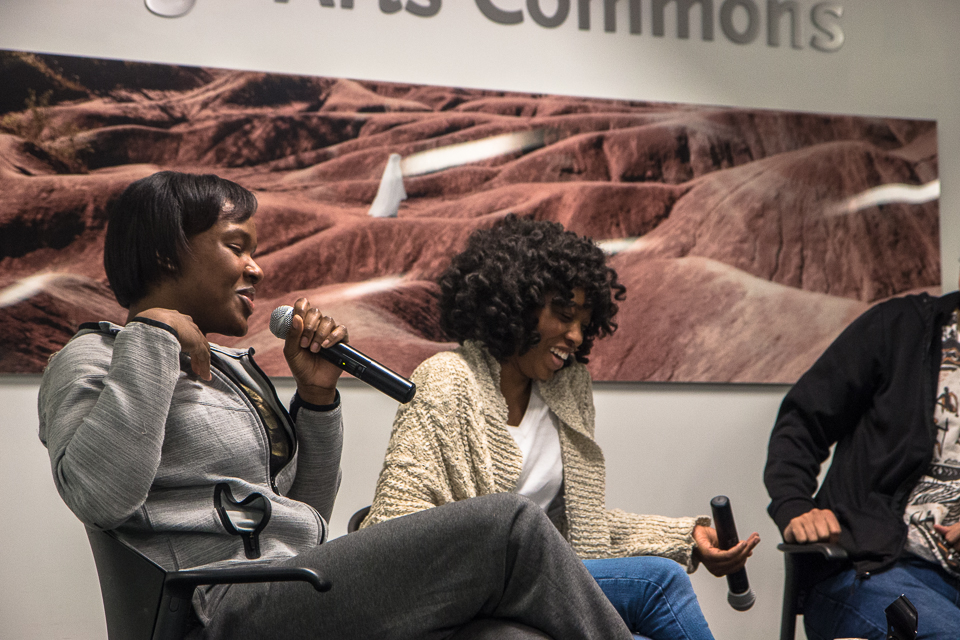There’s no doubt hip-hop has widely influenced the popular music scene today. More so, it has become a globally accessible culture with its own language, style of dress, music and mindset, consisting of five main elements created by the legendary Afrika Bambaataa: graffiti art, breakdancing, DJing, emceeing and knowledge of self.
In recent years, schools across North America have begun to incorporate hip-hop into the classroom, both as a subject and a practice, recognizing its importance in addressing the values and needs of self-expression of a culture.
At Toronto’s Ryerson University, O’neil Edwards, program director of Spanning the Gaps – a program through the G. Raymond Chang School of Continuing Education that gives learners access to post-secondary education who might not otherwise engage in it due to social, economic or personal obstacles – is leading the development of the institution’s first-ever academic, credited course in hip-hop to be made available in 2017.
Students will divulge in such topics as the art of sampling, the politics of space as it relates to graffiti and the dynamics of power that’s been seen in the evolution of hip-hop. The idea emerged from a workshop Edwards held last year on the history of hip-hop and sneakers, which sparked new discussion for harnessing the power of hip-hop education.

Students will divulge in such topics as the art of sampling, the politics of space as it relates to graffiti and the dynamics of power that’s been seen in the evolution of hip-hop.
In March, Spanning the Gaps hosted the Know the Ledge hip-hop panel, featuring artists and educators Salman “Ylook” Rana, Dr. Mark V. Campbell, Judi “JuLo” Lopez, Shaheen Ariefdien, and pHoenix Pagliacci, all notable in their own right for their dedication to the hip-hop culture, to discuss the benefits and challenges of hip-hop in the classroom.
Emcee-singer-songwriter Pagliacci has seen hip-hop used powerfully as an education tool. Last year, she was introduced to a science teacher with the Toronto District School Board, who incorporated hip-hop into selected schools as a pilot project. She was blown away by what she witnessed: kids were making raps and poems, presenting their math exams in rhythm form, having drumming circles in their science classes and learning about the periodic table’s elements as if they were like rappers.
“Everybody learns differently,” says Pagliacci, who has worked with artists like Ghostface Killah, Killah Priest and Fefe Dobson to name a few. “This is an amazing opportunity for these kids who [might be] ‘at-risk’ [or] have learning disabilities to be equals in their classrooms.”
“They listen to his metaphors and analogies and they start learning these little things, that if they practise enough, becomes the key to magic.”
Classes such as these have proven to be effective in the States for years now, fostering a learning environment where teachers can tap into the brilliance and creativity of their students unlike with the traditional, pedagogical frameworks set in place.
“Hip-hop is probably the one culture that breaks barriers, that breaks culture, that breaks religion … We are all connecting through this culture because that’s the one thing that we love, you know, and so it’s bringing peace into the classroom as well,” says Lopez, founder of KeepRockinYou, a breakdancing organization for women and b-girls of over 15 years.
According to Chris Emdin, hip-hop educator and associate professor at Columbia University, the ‘magic’ needed to engage a student starts with teacher education. In his 2013 Ted Talk, he argues that “content and theories with the absence of magic of teaching and learning mean nothing.” At his teacher education classes at Columbia, he has his students watch rap concerts to learn just what this magic is.
“They watch the way that the rappers move and talk with their hands. They study the way that he walks proudly across the stage. They listen to his metaphors and analogies and they start learning these little things, that if they practise enough, becomes the key to magic,” explains Emdin, who is also co-creator of the #HipHopEd social media movement.
But Pagliacci recognizes there’s a thin line between appreciation and appropriation. Educators who are not engrossed in hip-hop have their place in furthering the culture, but she says they must do it from a place of appreciation. When it comes to learning, educators are held at a high standard as they have the power to influence impressionable, young minds. Danger arises when students start applying what they’ve learned about the culture to their own lives.
“What part of the story will [students] note as the thesis? Will they apply the stereotypical lessons (i.e. ‘f*ck b*tches, get money’) or will they see the culture for the unifying potential it possesses?” Pagliacci says.

“What part of the story will [students] note as the thesis? Will they apply the stereotypical lessons or will they see the culture for the unifying potential it possesses?”
Quite often, the people who have the ‘magical’ skills to teach and engage students are those from the hip-hop community who are steeped in the culture.
Grammy award winning DJ and producer, 9th Wonder, of disbanded hip-hop group Little Brother, is currently an adjunct professor at Duke University co-teaching a class titled, “Sampling Soul” with Dr. Mark Anthony Neal. He is also a fellow at Harvard University researching at the Hiphop Archive and Research Institute, which aims to “facilitate and encourage the pursuit of knowledge, art, culture and responsible leadership through hip-hop,” according to its website.
Rapper Bun B, of famed rap duo Underground Kingz, launched the popular Religion and Hip-Hop Culture course he teaches alongside Anthony Pinn at Rice University online last February.
Hip-hop in the classroom cannot be mistaken as a crutch for a failing education system.
Discussions between the hip-hop community and the academy are not without their challenges though. Tension brews over how to govern the practice, study and expansion of the culture.
First, how should hip-hop education be defined? Rana, whose career began as an emcee in the Toronto hip-hop collective, the Circle (Kardinal Offishall, Jully Black and Choclair, among others), and continues in academia, claims that hip-hop is a radical proposition.
“I’m not a trained pedagogue being an academic. I’m trying to figure out teaching, what I put in front of the classroom, but it’s a definitional issue too. What is hip-hop education, and what does that mean in various different settings, because it’s not only an institutional thing.”
Ariefdien agrees and adds that hip-hop in the classroom cannot be mistaken as a crutch for a failing education system.
“It’s in the same way that you have youth programs, sports programs and arts programs being thrown in our communities to be able to deal with the structural inequalities and exploitations and racisms and classisms and all those kinds of things that hip-hop is now supposed to do this magical kind of work,” explains the South African-born artist, whose other accolades include student, educator, writer, music producer and child & youth worker.
Communities are still in need of counselling and wellness programs to help people cope with feelings of trauma and alienation – deep-seated issues that hip-hop education was never designed to address alone and fall under broader policy initiatives.
“Every single thing I learned, I learned from hip-hop.”
When it comes to content, the academy tends to place parameters on the provocative language hip-hop uses to convey meaning about life, but according to Campbell, a scholar, DJ and advocate of the arts, “If we can’t offend anyone, how is anyone actually going to feel what we’re saying?”
Hip-hop lyrics have always been reflective of the political, social and economic conditions of the time. Why stop now?
“Every single thing I learned, I learned from hip-hop,” Campbell admits candidly.
In order to maintain its cultural relevancy, he says hip-hop at the post-secondary level, or even in high school, needs to be a disruptive force.
“It needs to be something that troubles all of the norms. It needs to be something that empowers students on the margins.”
Photos © Chantal ‘Rose’ Gregory & Urbanology Magazine




Comments are closed.